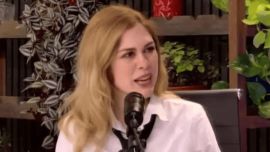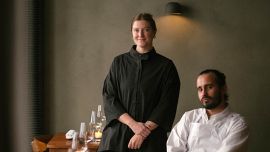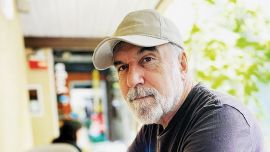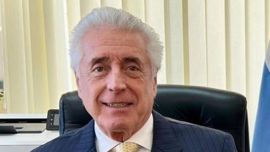Mother Nature has come to the rescue of the environment by showing her ugliest face. When the climate change prophets of gloom and doom insisted that modern consumer society was not sustainable in the long or perhaps not even medium term, hardly anybody listened seriously – now the urgency of the coronavirus pandemic has brought all that commercialism to a shudderingly sudden halt with terrifying plunges in sales percentages. It seems that only Lord Tennyson’s “Nature red in tooth and claw” works with no respect for the colour green – for consumer society green is a green light and only a red light stops traffic.
The Environment and Sustainable Development Ministry of the Alberto Fernández administration needs to be seen in this context. At the outset of this presidency if anybody in government were asked to think green, it was probably the face of Benjamin Franklin rather than Greta Thunberg which came to most minds. What surer way then to find those scant dollars than all-out development of Vaca Muerta shale, which working to full potential could transform exports of US$60-70 billion into 12 digits? “Shale without fail” was the general watchword even if environmental rhetoric (including continued adherence to international agreements on climate change) could always make a virtue out of necessity while fracking was lacking with the massive investment required for full potential yet to appear. There was vast consensus among the experts that energy, agriculture and mining were the key sectors for hard currency but what did this boil down to in environmental terms? The dead cow of Vaca Muerta fracking along with live but flatulent cows.
But with Vaca Muerta a dead cow indeed after the oil futures for this month crashed into negative territory a fortnight ago, the environment has gained a reprieve, even if the famous dilemma between health and the economy crowds out all else. Some voices have recently argued that the pandemic is a new punishment for disrespecting nature alongside climate change but this argument mixes apples and oranges – ever since Biblical times plagues have afflicted countless generations of humanity far more respectful of nature so that Covid-19 does not really serve to place the environment on the front-burner.
Environment and Sustainable Development Minister Juan Cabandié Alfonsín, 42, twins his Interior colleague Eduardo “Wado” de Pedro in at least two respects – both belong to the La Cámpora militant grouping and both are the children of missing parents. Since Cabandié did not even know his true identity for the first 26 years of his life (he grew up as Juan Falco, the son of a policeman), he cannot be expected to have much curriculum vitae. Of the 16 years under his true identity he has spent 12 as a legislator, divided evenly between the municipal and national levels – in 2007 he entered the City Legislature (where he headed the Frente para la Victoria caucus as from 2009) before moving to national Congress in 2013 where he remained until named minister last December.
No visible credentials for this ministry but that is nothing new in Argentina, where the environment has always been an orphan of politics. There was not even a permanent government department until 1991 (although the 1973-1976 Peronist government did create a pioneering secretariat, immediately crushed by the military dictatorship) – Carlos Menem restored the department but his choice of secretary turned out to be a bad joke, María Julia Alsogaray. Her successors were non-entities lacking any serious qualifications with the exception of Romina Picolotti (2006-2008), a prize-winning environmental activist who however proved unable to control her family’s lavish use of public funds and was fired for nepotism and corruption. For the rest of Kirchnerismo the post strangely became the personal choice of the Cabinet chief (especially Aníbal Fernández and current Chaco Governor Jorge Capitanich ,with Alberto Fernández already gone) and invariably a political crony. In 2015, Mauricio Macri promoted the department to a Ministry (only to downgrade it again last year) but made the eccentric choice of a rabbi with zero background, Sergio Bergman, to head it when he had Juan Carlos Villalonga, the director of Greenpeace Argentina for 17 years, in his ranks as a PRO deputy. Now, under Alberto Fernández, the ministry is back but not standing tall just yet.
Despite this discouraging history there were glimmers of environmental spirit amid the Vaca Muerta priorities in the 14 weeks before quarantine totally occupied the agenda. Just before Christmas there was a massive popular backlash in Mendoza when its new Radical Governor Rodolfo Suárez sought to encourage the mining industry by removing the ban on the use of cyanide, forcing him to withdraw the initiative. Then Productive Development Minister Matías Kulfas (the subject of last week’s column) started off this year by promising a “Green New Deal” with a focus on renewable energy – but why was Kulfas the minister talking green instead of Cabandié, it might be asked?
Nevertheless, Cabandié has not been totally silent on his ministerial objectives – it is more a question of their receiving minimal media coverage. He has promised to go to COP 26 in Glasgow in December (now kicked back to 2021) with a complete long-term strategic plan worked out but still early days for that. Having spent all his life in this city, perhaps his leading personal concern is the very urban one of open-air garbage dumps (some 5,000 of them nationwide), proposing to spend the most time on this problem including daily meetings with mayors. Cabandié sees the key to a solution here as the separation of cyclable materials, which ties in with his other main objective of teaching more environmental awareness in schools. His approach to the mining industry is not the most aggressive – both jobs and the planet must be saved, he insists. In general, his policies on other environmental issues such as deforestation and cleaning up the Riachuelo are still a work in progress.
But why expect too much action from Cabandié when most of his staff is in quarantine while the pandemic is doing their work for them? Worldwide, pollution figures are falling by percentages almost as dramatic as the plunge in consumer sales (or oil prices) with lockdown – Europe reports 54 percent less air pollution, which has been approximately halved here. Yet this lockdown is a temporary respite, when things do return to normal, it should not only be a question of bringing the economy back on stream but also balancing it with the environment. The problem of climate change has been overtaken by the pandemic but when we can finally forget about coronavirus, we should not forget climate change.



















Comments